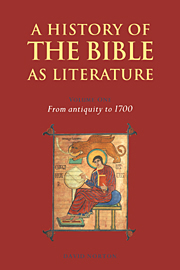Book contents
- Frontmatter
- Contents
- List of plates
- Preface
- List of abbreviations
- 1 ‘This treasure in earthen vessels’
- 2 The early Christians and biblical eloquence
- 3 Jerome
- 4 Augustine and his successors
- 5 The occult text
- 6 The challenge to the translators
- 7 Slaves of the Vulgate
- 8 Creators of English
- 9 From the Great Bible to the Rheims-Douai Bible
- 10 The King James Bible
- 11 Presentations of the text, 1525–1625
- 12 Sixteenth-century movements towards literary praise and appreciation of the Bible
- 13 The struggle for acceptance
- 14 ‘The eloquentest books in the world’
- 15 Versifying the Psalms
- 16 ‘The best materials in the world for poesy’
- Appendix
- Bibliography
- General index
- Biblical index
- Plate section
9 - From the Great Bible to the Rheims-Douai Bible
Published online by Cambridge University Press: 05 June 2012
- Frontmatter
- Contents
- List of plates
- Preface
- List of abbreviations
- 1 ‘This treasure in earthen vessels’
- 2 The early Christians and biblical eloquence
- 3 Jerome
- 4 Augustine and his successors
- 5 The occult text
- 6 The challenge to the translators
- 7 Slaves of the Vulgate
- 8 Creators of English
- 9 From the Great Bible to the Rheims-Douai Bible
- 10 The King James Bible
- 11 Presentations of the text, 1525–1625
- 12 Sixteenth-century movements towards literary praise and appreciation of the Bible
- 13 The struggle for acceptance
- 14 ‘The eloquentest books in the world’
- 15 Versifying the Psalms
- 16 ‘The best materials in the world for poesy’
- Appendix
- Bibliography
- General index
- Biblical index
- Plate section
Summary
Official Bibles
The years following the publication of Coverdale's first Bible are busy ones in the general history of the Bible. By 1541 the English Bible not only had Henry VIII's approval but was by his command to be placed in every parish church that had not yet obeyed a similar command of three years earlier. The maximum price of these Bibles was set at ten shillings unbound and twelve bound, trimmed and clasped. Though Henry acted to keep costs to the churches down, he made no provision for cheaper Bibles in a smaller format that might be owned by individuals of moderate means. Several Bibles attempted to meet this need before the Geneva Bible satisfied it. Edmund Becke, in the dedication of his 1549 folio edition of Matthew's Bible, writes that the price of the Great Bibles ‘seemeth to them some thing too excessive’, so that the people ‘have been either greatly discouraged thereby from buying of the same, or otherwise not of ability to disburse so much money for them, were forced to lack the fruition thereof’.
The Bible in English was part of the larger battle, political as much as theological, for the English Reformation. The clergy's political allegiance might be relatively easily diverted from Rome to London, but beliefs were not so readily changed. By no means all the clergy were enthusiasts for the vernacular Bible: if they could not suppress it they could at least attempt to make it more acceptable to themselves, that is, more like the Vulgate.
- Type
- Chapter
- Information
- A History of the Bible as Literature , pp. 114 - 138Publisher: Cambridge University PressPrint publication year: 1993



